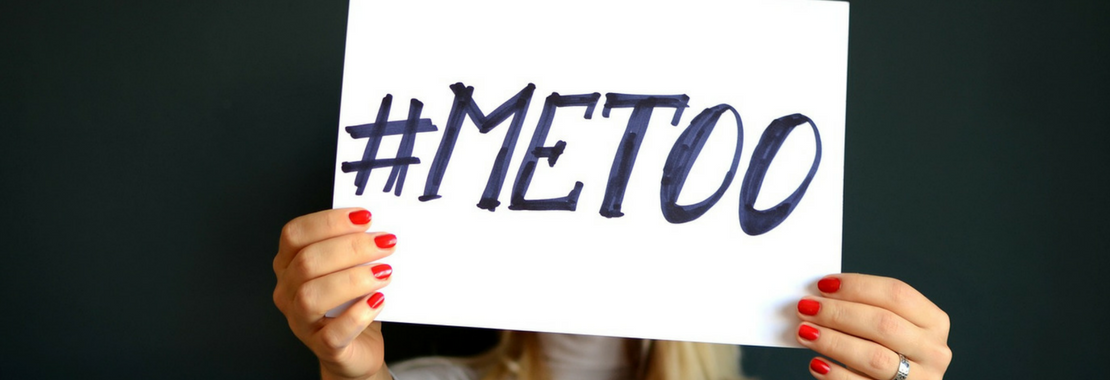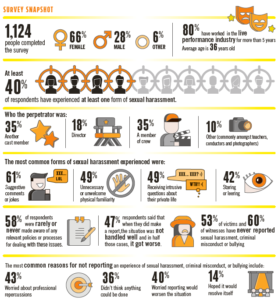Sexual harassment in the spotlight

In recent months there have been many shocking accounts of sexual harassment, assault and other misconduct both here and overseas. It’s time for action.
Sexual harassment is any unwelcome conduct of a sexual nature. If a reasonable person would anticipate that the behaviour might make you feel offended, humiliated, or intimidated, it may be sexual harassment.
Sexual harassment doesn’t have to be ongoing. A single incident can constitute sexual harassment.
Download or view online the MEAA Fact Sheet for further information on:
•Types of sexual harassment.
•Who is covered by workplace sexual harassment laws.
•Employer responsibilities.
•What should happen when you make a complaint of sexual harassment.
Find out more about police and other services available to report an assault and receive advice and counseling.
Between July and November 2017 MEAA Equity conducted a survey of sexual harassment, criminal misconduct and bullying in the Australian live performance industry. The results expose widespread abuse and a culture of fear.
•At least 40% of the 1,124 respondents have experienced sexual harassment, commonly on multiple occasions.
•Almost a quarter of victims of sexual harassment, assault or bullying in live theatre do not make a complaint because they fear it will have repercussions for their career.
•A staggering 75% say they are not made aware of a company’s policy on harassment.
Infographic: Sexual harassment in the spotlight.
Download here
Survey Snapshot: MEAA 2017 sexual harassment in live theatre survey. Download here
MEAA Press Release: New collaborative approach to overcome culture of fear over sexual harassment in theatre. Download here
We are Artists for Safe Theatres, a group of freelance Australian theatre artists. We are working to achieve safe theatrical workspaces in Australia, free of harassment and bullying.
Our work began in late 2016 when we initiated a research project to better understand sexual harassment and bullying in Australian theatre.
We knew, from personal experience and anecdotal evidence, that sexual harassment and bullying was a problem in our theatres. We wanted to better understand the scope and complexity of that problem.
We needed to hear the experiences of those who had been affected. We hoped that, through better understanding these experiences, we could start a conversation about genuine change.
In 2017, we spoke with more than 100 theatre artists and practitioners. Each of them had experienced sexual harassment or bullying within a theatrical workspace in Australia.
As we began to understand the large scale of the problem, we approached MEAA to support our research effort. They eagerly jumped on board.
MEAA undertook to supplement our qualitative research with statistical data about the extent of sexual harassment, criminal misconduct and bullying in Australian live performance.
By late 2017, this qualitative and quantitative research was complete. The evidence was grim. It was clear that sexual harassment and bullying were widespread in Australian theatre. There needed to be major systemic and cultural changes in Australia’s theatrical workspaces.
We sent the results of our research to Australia’s major theatre companies in mid December 2017. Along with this research, we included an invitation to attend an independently facilitated national theatre forum.
At this forum we would collaboratively re-think and re-write policies, protocols and artistic practices in our theatres.
Our invitation was accepted by all.
What’s happening now
A national theatre forum has been scheduled for March 17 and 18, 2018.
The forum is to tackle the systemic problem of harassment and bullying in the theatre industry, and commit to a path forward.
In attendance will be representatives from all CAST companies, Griffin Theatre, Ensemble Theatre and La Boite Theatre. The forum will also include representatives from MEAA, Australia Council and Theatre Network Australia. And we will be there – a team of artists.
The forum is a unique opportunity to acknowledge and take responsibility for the systemic problems of harassment and bullying in our industry.
It offers a chance to collaboratively work together to solve these problems. To commit to making changes that are genuine and lasting. And to be held accountable for that change.
We, Artists for Safe Theatres, are now working hard to achieve the best possible outcomes at this forum. We are researching safe creative process, best practice policy solutions and successful responses to harassment and bullying across multiple sectors, both in Australia and internationally.
Importantly, we want to work with, listen to and learn from you – our community.
How to get involved
We are freelance theatre artists. We will be at the forum to represent our freelance theatrical community. We want to hear from you.
We need your ideas. Your questions. Your creative solutions.
We want to know what kind of creative and safe culture you want to work in.
Please get in touch if you have any questions, suggestions or solutions.
Email Sophie Ross, and the team at Artists for Safe Theatres at safetheatres@gmail.com.
How to access support
If you have experienced or witnessed harassment or bullying, and want to access support, here are a few pathways to get you started.
- A list of counselling, police and legal support services across all Australian states and territories can be found here.
- If you need extra support coping with your experiences, a good place to start is a GP. GPs can work with you to find and access the right support for you.
- If you’re interested in seeing a clinical psychologist, but don’t know how to find the right one for you, a great resource is the Find a Clinical Psychologist page on the Australian Clinical Psychology Association website.
- Remember that you don’t need a referral to contact a clinical psychologist. If you’ve found one or more that interest you, you can get in touch with questions about their practice and therapy models.
If you’ve got any questions about these pathways, get in touch with Sophie Ross and the team at Artists for Safe Theatres at safetheatres@gmail.com. We will work with you to access the support you need.
If you experience or witness sexual harassment while at work, you shouldn’t be afraid to speak up and, if appropriate, to make a formal complaint.
Who you report an incident of sexual harassment to will differ on each production, it could be a dedicated HR person, stage manager or producer. You should make a time to talk to that person privately and have the right to bring a person for support if you need.
It’s important to know that MEAA can provide support, in various capacities, for all members who experience such issues in the workplace.
MEAA recommends that assault or other criminal offences should be reported directly to the police in your state.
Find out more about police and other services available to report an assault and receive advice and counseling.
New codes of conduct to prevent sexual harassment, bullying and discrimination officially came into force on September 3, 2018.
The codes (covering stage and screen) are the result of months of negotiation between MEAA, Screen Producers Australia and Live Performance Australia, as well as extensive consultation with actors and crew. The introduction of the codes will be accompanied by education and training to ensure they are adhered to on every production.
Download Screen Industry Code here.
Download Stage Industry Code here.
Australian Live Performance Industry Code of Practice to Prevent Workplace Discrimination, Harassment, Sexual Harassment and Bullying. Download here
Australian Screen Industry Code of Practice for Discrimination, Harassment, Sexual Harassment and Bullying. Download here
MEAA Fact Sheet: Sexual Harassment in the Workplace. Download or view online
MEAA Media Release: New collaborative approach to overcome culture of fear over sexual harassment in theatre. Download here
Infographic: Sexual harassment in the spotlight. Download here
MEAA Media Release: Protecting theatre workers from sexual harassment. Download here
Video: MEAA & #MeToo Part 1: What We Can Do.Watch here
MEAA Fact Sheet: Sexual assault and harassment: where to get help. Download here
